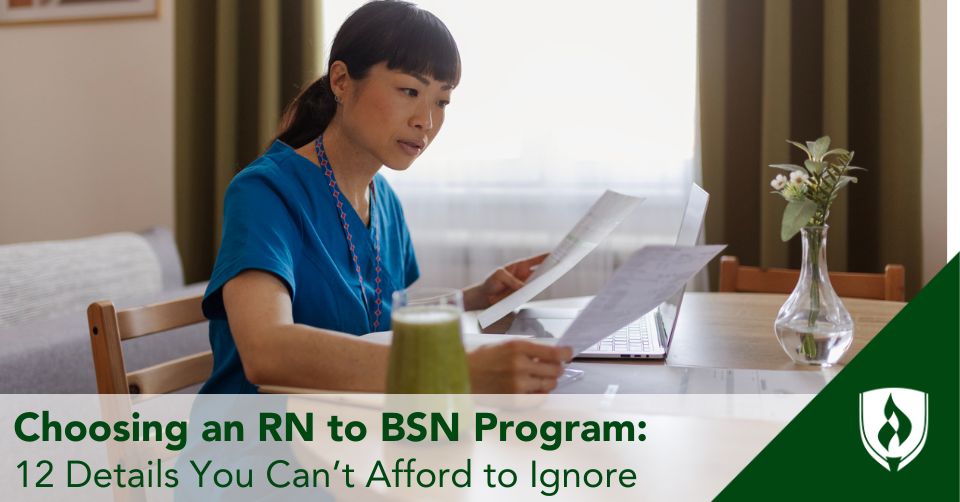
Choosing an RN to BSN program might feel like you’re taking a stab in the dark. There are a lot of degree programs out there. And if you’re just starting out in your search, it might be tricky to pinpoint the differences from one nursing school to another.
Naturally, you want to make sure the bachelor’s degree program you select doesn’t set you up to fail. Read on to find out what to look for in a nursing school program—and how to tell if it’s going to be the right choice for you!
Ready to advance your nursing career?
Explore Rasmussen University's RN to BSN program todayConsider these 12 factors before you enroll in an RN to BSN program
As you explore nursing programs online, you’re going to find yourself sifting through mounds of information. Here are some of the most important details you need to look out for.
1. Institutional and program accreditation
With so many nursing education programs to choose from, RN to BSN program accreditation should be at the top of your wish list. When a program is accredited, this means an accreditation commission—an official, third-party authority who creates standards for educational programs—has reviewed it and determined the coursework meets their standards of quality.
Rasmussen’s online RN to BSN program is accredited by the Commission on Collegiate Nursing Education (CCNE). “The program prepares students to be the best BSN-prepared nurses possible,” says Nursing instructor, Christina Tedesco. “Program goals and objectives are in accordance and alignment with the AACN® Essentials and other areas of accreditation to guarantee credibility,” she adds.
2. Minimum weekly time commitment
When you’re evaluating an RN-BSN program, consider how much time it’ll demand, and weigh that against your current routine. This is especially important if you’re looking at a nursing program that requires in-person attendance. Traveling to campus and finding parking can easily eat up hours each week—do you have enough room in your schedule for that?
Beyond your work schedule, commute, family time, self-care and other obligations, how many hours are you left with each week? And when, specifically, are those hours? Are you free at the same days and times every week, or does your work schedule fluctuate? Your answers to each of these questions will help you identify which programs best fit your needs.
3. Program structure
Many registered nurses who work in hospital settings are required to be on-call.1 As a result, their schedules can be tough to work around (you may even have firsthand experience with this, yourself, as a licensed RN). Trying to make it to in-person classes at a traditional brick-and-mortar university may prove impossible when your schedule’s constantly changing.
Online RN to BSN programs can offer the flexibility needed to work around a tight—or unpredictable—schedule. But, keep in mind, not all universities operate the same way. For example, some online programs use what’s called, “synchronous learning,” which means all students and instructors “meet” online at the same time.
When you’re looking to fit in class time around a hectic work schedule, however, you want to identify programs that offer asynchronous learning. That way, you can access coursework as your schedule permits.
“Rasmussen’s online format allows for increased flexibility and time management for students to have a work/life/school balance,” Tedesco says. Nursing students may view live sessions and recordings on their own time, as Tedesco explains. This creates the opportunity to design your own school schedule when you’re employed as a registered nurse while you’re pursuing your BSN degree.
4. Program start dates and duration
How soon do you want to enroll in your first class? When are you hoping to graduate? And what’s a realistic timeline for you to complete your BSN degree?
Generally, full-time nursing school students can graduate faster than their part-time counterparts. But when you’re juggling employment and family obligations outside of school, taking online courses part-time might be a better choice.
Take note of every RN to BSN program start dates, credit hour requirements and minimum vs. maximum numbers of credits each program requires. These details differ from one nursing school to the next, and they can have a huge impact on your academic success.
At Rasmussen, RN to BSN students can choose from eight start dates per year. And the entire program can be completed in as few as 12-18 months. 2
5. Program pacing
As you research nursing programs, seek out information about what’s expected of students—and when. Many online RN to BSN programs require students to participate in weekly discussion threads together with classmates and instructors. It’s also common for online students to have weekly quizzes, tests, assignments and other deliverables due. Some online programs, however, offer more flexibility than others.
Rasmussen’s RN-BSN degree program consists mostly of courses that allow students to work at their own pace. “You don’t have those weekly deadlines,” says Nursing instructor, Candy Bradbury. “Not only are students completing these deliverables within their courses, but they’re able to apply them to the real-world, to their actual practice,” she adds.
Having the freedom to complete coursework at any point during the quarter can certainly be liberating. But, as many of us learned in high school, there’s a real danger to waiting until the last minute to start an assignment. If you struggle with procrastination, be sure to brush up on time management tips to help you stay on top of your course load.
6. Transfer credit opportunities
Being able to transfer credits towards your baccalaureate degree can help save you a tremendous amount of time on your education. As a licensed registered nurse, you might have already completed prior education—such as an Associate’s Degree in Nursing (ADN) program—that may be counted towards BSN degree requirements.
Always inquire about transfer credit policies whenever you’re researching an RN to BSN program. Currently, Rasmussen University allows students to transfer up to 135 credits ((no more than 75% may be completed via transfer credits) towards the online RN to BSN program.
7. Licensure—and other admission—requirements
There’s actually more than one way to earn a BSN degree. Many institutions, including Rasmussen, offer BSN programs for students who are not yet licensed registered nurses (sometimes referred to as “standard BSN degree programs”).
The tradeoff is that a standard BSN degree program takes longer to complete than an RN to BSN program. That’s because the standard program includes coursework to help prepare students to sit for the NCLEX-RN® exam so they can obtain RN licensure. As you might suspect, a standard BSN program has different admission requirements from an RN to BSN program.
To be accepted into an RN-BSN program, you’ll usually need an active, unencumbered RN license, for starters. Additional requirements beyond having a valid license will likely vary between institutions, but they may include:
- Passing a placement or entrance exam
- Providing transcripts from previously attended institutions
- Proof of immunizations
- Completing a physical exam
- Passing a criminal background check
- CPR certification
8. Nursing skills covered
Whenever you’re evaluating an RN to BSN program, take a moment to flip through the course catalog and see what types of nursing skills it emphasizes. How do they stack up against your current strengths and weaknesses? Do they align with your career goals?
Rasmussen’s RN to BSN program goes above and beyond the fundamentals of patient care. Each course incorporates projects that align with employer-approved skills to help empower students for real-world challenges they may face throughout their careers.3
In fact, Bradbury’s course, Integration of Genetics and Genomics into Ethical Nursing Practice, touches on key issues registered nurses see nearly every day. “[Students] are able to recognize in their own practice how not just genetics but also environment plays a role [in disease processes and] how to approach ethical dilemmas,” she says.
9. Clinical rotation requirements
Believe it or not, some universities offer RN to BSN programs that do not require clinical rotations. While this may provide increased flexibility for students to complete their studies, working in a clinical practice offers a hands-on learning experience that, arguably, can’t be replicated.
In Rasmussen’s online RN to BSN program, clinical rotations are usually completed during a student’s third or fourth term, Bradbury says. “By the time students get to the clinical portion, they’ve already built a strong foundation [through required coursework],” she adds.
10. Tuition expenses
Your nursing degree is an investment in yourself and your future—but that doesn’t mean affordability should go out the window. The costs of BSN degrees varies dramatically among nursing schools. Whether you intend to apply for financial aid or not, finding budget-friendly RN to BSN program is a smart move.
And speaking of financial assistance, you may have a special advantage as a working, registered nurse. According to the Bureau of Labor Statistics (BLS), there are employers who offer tuition reimbursement for RN to BSN programs.4 So, before you enroll, take a trip to your HR department and find out if you’re eligible for tuition assistance—it could seriously cut down the cost of your degree.
11. Campus culture
Even in an online program, you want to feel like you’re part of a welcoming, friendly and inclusive community. “Our student population is diverse, including students from different backgrounds, age groups, and genders,” Tedesco says. “Some students are older and working full-time adults with family responsibilities, and others are younger and fairly new to nursing.”
Being a part of a diverse classroom—online or in-person—is also a wonderful advantage for your own education. “That diverse student body really adds depth to these courses and the RN to BSN program,” says Bradbury. “We have nurses that work in public health. We have nurses that work in schools, corrections, nursing, VA, military. We have active military members who are also involved in the program.”
With working nurses from all walks of life as your classmates, an RN to BSN program provides you with networking opportunities and the chance to learn from the experiences of others.
12. Graduate-level coursework integration
Some RN to BSN programs allow students to complete master’s-level coursework to further advance their studies. This is especially beneficial if you’re interested in pursuing a career as a clinical nurse specialist (CSN), which requires a master’s degree, according to the BLS.4
Rasmussen’s online RN to BSN program allows nursing students to take up to two Master of Science in Nursing (MSN) courses at no extra tuition cost. Even if you’re currently unsure about whether you’ll someday pursue a master’s degree, being able to earn those graduate-level credits could be worthwhile.
Ready to learn more about Rasmussen’s RN to BSN degree program?
From career advancement opportunities to improved patient outcomes, there are so many reasons to pursue your BSN degree. In fact, patient mortality risks decrease significantly in hospitals with higher rates of BSN-prepared nurses, according to the American Association of Colleges of Nursing.5 Choosing to earn your bachelor’s degree, then, is one of the best decisions you can make for your patients and their families.
Rasmussen’s online RN to BSN program expands upon your existing nursing experience through competency-based education (CBE). “There are three opportunities to achieve mastery in each assigned deliverable,” says Tedesco. As she explains, this allows students to learn from and integrate instructors’ feedback as they complete coursework.
“I’ve been with Rasmussen for nine years,” Bradbury says, adding, “and I’m proud to be part of this university because of the RN to BSN program. I believe in the program. I believe in our students. I believe in our faculty.”
Don't wait to elevate your nursing career.
Learn more about Rasmussen University's flexible online RN to BSN program and request information nowLearn more about Rasmussen University’s online RN to BSN program.
AACN® is a registered trademark of AMERICAN ASSOCIATION OF CRITICAL-CARE NURSES, INC.
Empowered Learning® is a registered trademark of Rasmussen College, LLC
NCLEX-RN® is a registered trademark of National Council of State Boards of Nursing, Inc.
1Emily Rice, RN, On Call Nursing: What it is and How to Prepare, (Jan.30 2023), On-Call Nursing: What it is and How to Prepare - General Specialties Support (allnurses.com)
2Completion time is dependent on transfer credits accepted and the number of courses completed each term.
3Rasmussen University, Competency-Based Education Empowered Learning®, (accessed May 2024), Empowered Learning® | Rasmussen University




